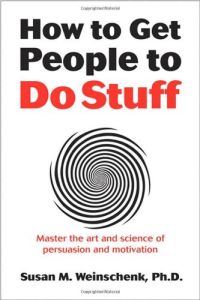
How to Get People to Do Stuff
Master the Art and Science of Persuasion and Motivation
Recommendation
Behaviorist Susan M. Weinschenk explains how to persuade others to “do stuff” you want done by using the findings of neuroscience and psychology to tap into seven basic human motivational drives: “the need to belong, habits, the power of stories, carrots and sticks, instincts, the desire for mastery,” and “tricks of the mind.” She cites scientific studies that affirm some aspects of the “folk wisdom” of motivation and overturn many others, triggering a revolution in behaviorism. Though Weinschenk skates over issues of potential manipulation, she packs smart insights into her punchy, unflinchingly practical book. getAbstract recommends her guidance to managers, marketers and leaders seeking straightforward, evidence-based strategies for influencing and persuading people.
Summary
About the Author
Psychologist and behavioral scientist Susan M. Weinschenk, PhD, also wrote 100 Things Every Designer Needs to Know About People and Neuro Web Design: What Makes Them Click?



















Comment on this summary